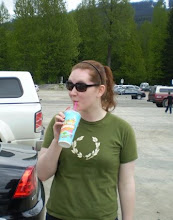 So, my friend Kerrilynn just came over to show me her video that she made for our Women's Studies 211 class (the same class that I created this blog for), and it was amazing! She deals with so many issues of gendered spaces in our society, as well as how individuals interact with particular spaces depending on their gender (sound familiar?). One particular segment of her video really resonated with me, and I thought that I would share it on my blog as it relates to what I've been talking about in the last few posts (interactions with space differing depending on one's experience of gender).
So, my friend Kerrilynn just came over to show me her video that she made for our Women's Studies 211 class (the same class that I created this blog for), and it was amazing! She deals with so many issues of gendered spaces in our society, as well as how individuals interact with particular spaces depending on their gender (sound familiar?). One particular segment of her video really resonated with me, and I thought that I would share it on my blog as it relates to what I've been talking about in the last few posts (interactions with space differing depending on one's experience of gender). This particular segment of Kerrilynn's video deals with fear of night, especially women's fear of nighttime and darkness. At the beginning of the segment, she mentions that not only are most women terrified of going out alone at night, but darkness itself could be described as a social construction. To demonstrate this, Kerrilynn films herself walking quickly along streets and paths in Charlottetown after nightfall with a worried/frightened/scared-shitless look on her face. Without any words spoken at all, the viewer can really see that she is truly afraid of being alone in the darkness.
So what does this mean? Why are most women afraid of going out alone at night? Some women are even afraid to go out at night with other women unless there is a man present. Why the sense of danger once the sun has gone down? Is it because women become less visible at night, therefore are less protected from danger? Is there an assumption that all of the "predators" and rapists come out at night with the specific intent to prey on lone women?
During week 6 of our WS211 class, one of the assigned readings was Hille Koskela's article, "'Gendered Exclusions': Women's Fear of Violence and Changing Relations to Space". This article goes into great detail about women's increasing fear of violence, as well as where, when, and why women are becoming more and more afraid of certain spaces. One of Koskela's main arguments is that women are becoming increasingly afraid of night and darkness, and only venture outside during daylight hours because of the perception of possible violence, harassment, assault, or some form of victimization at night. She goes on to say that fear itself is a social construction, which is perpetuated through discussions with friends and news reports in the media (115). And while some may argue that fear cannot possibly be a social construction because we all feel it, and it's just a "natural instinct", one can argue back that it is impossible to know whether or not humans are innately fearful, because we have all been taught to be fearful of certain things from the moment we are born. Furthermore, fear has been perpetuated throughout history by the various forms of media and communication that continue to invade our minds, homes, and beahviours to this day. Fear has become entrenched within us, but we have somehow come to assume that it is a natural part of the human experience.
So what do we do with this information? What can we do to reduce women's fear of night, darkness, and space in general? This is an increasingly problematic issue, as women's fear is increasing with time, not decreasing. Thoughts?

Hi Erica
ReplyDeleteYou have a good citation of helpful arcticles to understand the realtion between gender and space and your understanding of the same is also commendable.
I am a student of architecture and in one of my current assignment,i am researching about how the architecture of a particular space can make it more gender sensitive if not totally gender neutral. Also,how can architecture make the space safe for women,24x7
Please share your views on the same.